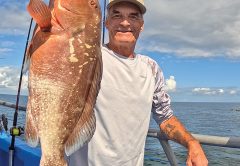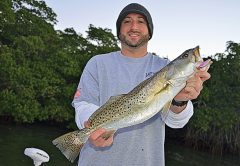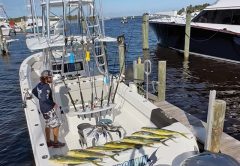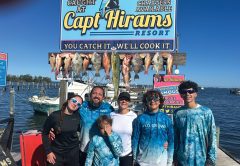August on the Treasure Coast is an exciting time of year to be in the water because lobster season is back, and grouper/hogfish seasons continue to remain open.
Manly locals who skipped the rush of lobster mini-season, may time their first dive trip in August to coincide with opening weekend of lobster season. Since grouper and hogfish seasons are both open, buddy teams may consider each taking a different role on the dive to increase the odds of success and not to get too overloaded with equipment. For example, one diver has lobster and lionfish supplies and the other carries the speargun and fish stringer. This way, each diver has a narrow objective, the other can lend help as needed and both can focus on being good at only one or two activities yet still have all options covered.
Last month, divers reported strong cold water upwellings up and down the coast with bottom temperatures reaching the low 60s for a few days. Short-lived cool spells are common this time of year, usually don’t last more than a few days to a week and are even welcomed by some to beat the heat at the surface. even on hot summer days, divers are wise to pack a wetsuit just in case.
Some believe cold water can help to drive fish and lobster into shallower reefs from far offshore as they try to escape the chilly conditions. Lobster with bright orange or purple bodies are thought to move in from deep reefs and are usually found after cold water moved through.
Luckily, the Gulf Stream’s strong currents do usually flush away upwellings in a week or two and for this reason, drift diving is the way to go. It’s important captains and divers review some important details before diving in heavy currents. Carrying a float ball is a critical part of the process and knowing what to do if the float line snaps or the ball gets pulled under while a diver is hooked off to the bottom can help everyone get back on board safely. Large capacity reels for more scope, handheld grappling hooks to hold the bottom and a two-buoy system are all great ways to handle heavy current. Large, rigid float balls with more volume tend to stay on the surface better them small Styrofoam styles used by snorkelers. Establishing an emergency recall system (like revving the engines three times) and agreeing when to activate professional search and rescue in the event of separation are all good practices. Divers should carry signal devices with them in the water like inflatable safety sausages, signal mirrors and whistles.




